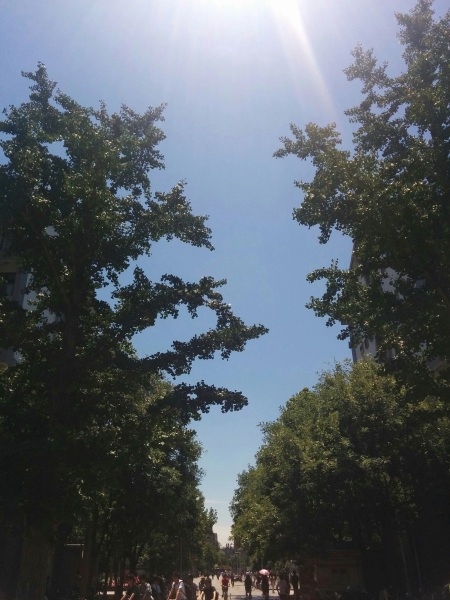This morning, I took the bus to Beijing Normal University with one of my EAPSI colleagues to participate in his experiment. He’s studying how English speakers learn Mandarin, with a focus on tones, judging by the things I did.
I had had to do a pretest to qualify for the experiment, which included a bunch of questions about how difficult it would be for me to do, among others, the following tasks:
1….bargain for items in a tourist shop.
3. …order food from a written menu without pictures.
4. …tell a taxi driver where to go even when I don’t know the specific name or address of the destination.
5. …politely ask a stranger for directions.
9. …debate issues such as free speech or the death penalty with a friend.
13. …discuss social problems such as air pollution or the gap between rich and poor with friends.
15. …specifically and clearly explain the details of a technical task in my professional field.
(e.g., how to remove a virus from a computer, how to use a microscope)
16. …read and understand novels that were written for native Chinese readers.
22. …make a lengthy toast at a banquet or wedding using appropriately formal language.
23. …ask a technical question at an academic conference or business meeting.
24. …effectively insult (assuming I wanted to) a rude haggler who will not leave me alone.
25. …explain the rules of a sport or other game (cards, board game).
It’s funny, because among the list are things I’ve gotten tons of experience in during my year-plus in China (1, 3, 4, 5), things I’ve specifically worked on (16, 25), things that I can do but without finesse (9,13), things that I came here this summer to work on (15, 23), and things that I think they should teach in Chinese courses (22, 24).
The tasks during the experiment consisted of listening to sentences and identifying which ones had something wrong, all while wearing an EEG cap and trying desperately not to blink. So, that was fun.
Nancy Sung, head of NSF-Beijing and one of our main EAPSI contacts, stopped by and took a picture of me as they applied the electrodes to my scalp.
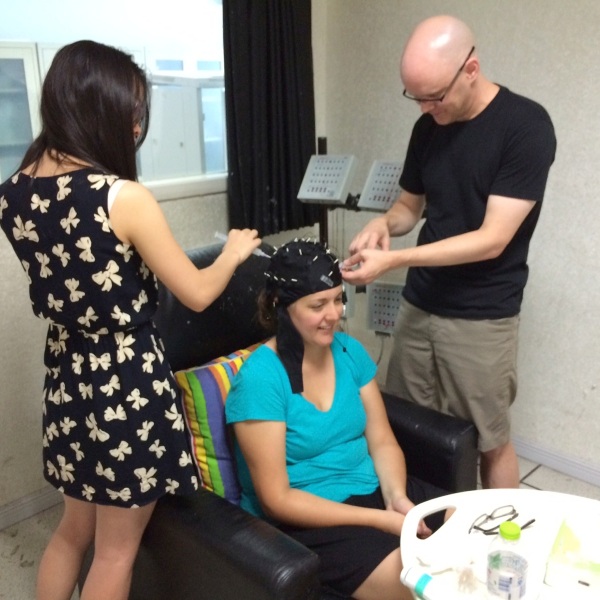
Then there was a lot of identifying of tones and a little bit of translation. It was the closest thing I’ve had to a Chinese test in 5 years! I made 300元 for my participation, so I indulged in a taxi ride home (28元) instead of an hour on a bus. Taxi conversations can be some of the best conversations – 20 minutes in a car with a sociable, knowledgeable local? Yes, please. This guy, naturally, asked what I was doing in Beijing – studying at Beijing Normal? Then, because my destination was the University of Mining Technology, he asked about that next. No, I’m at Tsinghua, a third university . . . This part of Beijing is absurd, though, just full of universities. He pointed them out as we drove by – government, medicine, electronics, technology, languages, geology, agriculture, etc.
After a shower to get the electrode gel out of my hair, I biked into lab. I stopped at KFC for a quick lunch – chicken burger, fries, and a drink for 15元, which is cheap for the US at $2 but equivalent to two or three cafeteria meals here. Plus I got two egg tarts, which were another 10元. Hey, big spender!
I got to lab in time for our afternoon group meeting. I must confess, I had a hard time following and spent much of the time clicking “random” on the xkcd page to find some good ones to share with my labmates. I showed GuoYang this one,

but he didn’t know what “nice try” meant. I tried explaining that it was sarcastic, giving some example usages, etc., but he just asked me, So this is funny? Yes, it’s supposed to be! Eventually he got it, and now we use this phrase all the time. (I never thought about how many situations this phrase can be used in!) I think when I leave they’re all going to speak fluent technical and sarcastic English. But again, you learn what you need to know . . .
After the lab meeting, we went downstairs to take pictures. There are four students graduating from the group, and a postdoc who is leaving.
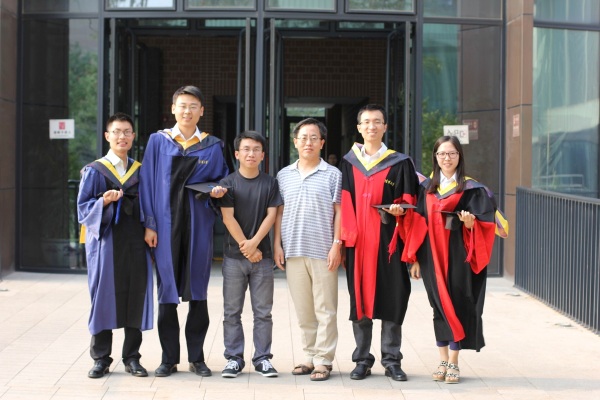
I knew we were going out to dinner, so I asked one labmate if I should dress up. No, she said, just the same as usual. It’s hard to know what that means, though – a few of the women wear dresses and high heels every day as if it were nothing, but some of the guys show up in sweatpants and t-shirts. I erred on the dressier side of things, and was glad because we took a lot of pictures. But sweatpants and shorts were still well represented.
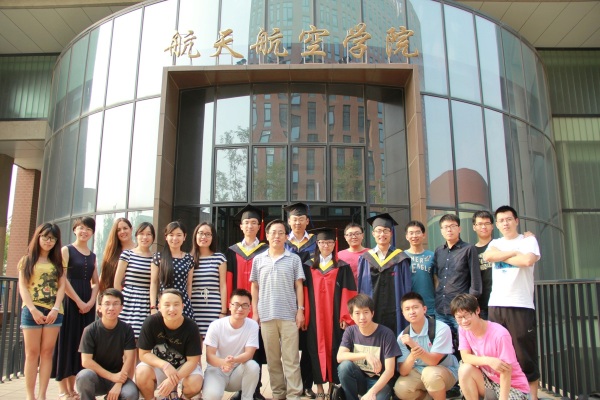
A few of the girls were wearing blue dresses as if they had coordinated, so I asked to take a picture of them.
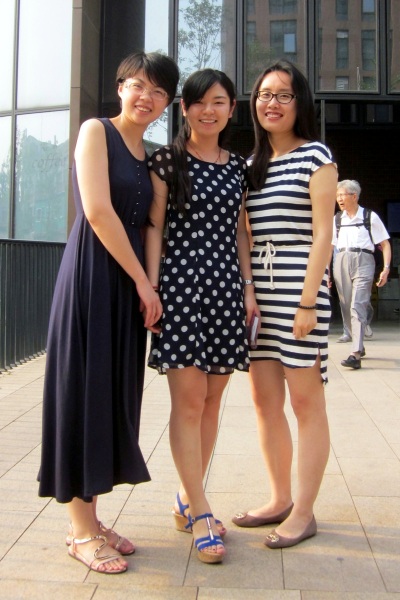
As Cheng pointed out, they’re my 蓝朋友s! [In the southern Chinese accent, “l” and “n” get mixed up, so I frequently get asked if I have a “lánpéngyoǔ” (blue friend) instead of “nánpéngyoǔ” (boyfriend).]
Once we had taken almost every permutation of group picture, we biked to a restaurant in Wudaokou for dinner. It was a nice, quiet place, off the busy roads, and we had two rooms to ourselves. Unfortunately, we had an awkward number of people, so we started out being too few for four tables and ended up being too many for three tables. It was cozy. There was a lot of shuffling, but after a brief scary time where I was put at a table with literally all of the people I didn’t know, I ended up with the best seat in the room. I was next to Cheng and Stacy, the four-year-old daughter of an older alumni. She was very shy at first, but eventually warmed up to me and we took some silly pictures together.
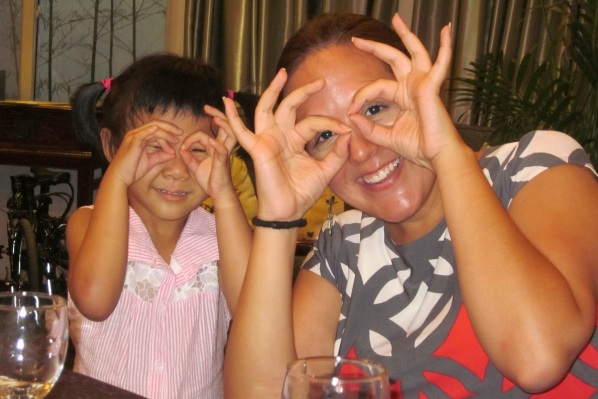
Also at my table were two of the graduating students, a few other students and their boyfriends, one of the professors I don’t really know at all, and Prof. Feng, my host.
My education in toasting is still probably not complete, but I feel like today was an advanced class. I learned (well, relearned; I think I knew this before) that it’s a sign of respect to toast with your glass lower than the other person. So, when toasting Prof. Feng he should definitely be the higher glass, but in most other situations both people are competing to be the lower glass. The result is a rapid dive-bomb from face height down to the table immediately before clinking glasses.
I also learned the nuances of large-group toasting: you can have one-on-one toasts, a whole table toasting one person, one person toasting a whole table, a whole table toasting a whole table, or one person toasting the whole room. Actually, my host told me there’s not much nuance, you’re just trying to get the other people drunk. The main targets were Prof. Feng, the graduating students, and Li Bo. At one point, everyone was toasting Bo and I heard him say, They’re coming again?? as a new group arrived. Haha! I also received much more than my fair share of toasts. There was one Masters graduate that I had never seen before, but we toasted like four times. The last time, he said “To world peace” and it was like a scene from Miss Congeniality.
The Yanjing beer we were drinking is 3.1%, so like Oklahoma beer. The baijiu was only 30%, too, and each toast was probably ¼ of a shot, so I was just not that intimidated, haha. Add in the fact that I probably weighed more than anyone else in the room, and my face doesn’t give me away by turning red when I drink like most of them, and they all thought I had an incredible capacity for alcohol. It’s also probably easy for me hide any tipsiness, because I make so many mistakes in Chinese even when sober . . . For instance, I had trouble writing down a character in my notebook when I learned a new word, but I can’t honestly attribute that to the alcohol :(
Prof. Feng’s old advisor was there, a very kind-looking older man. He is a very good calligrapher, and apparently the traditional graduation gift in the group is a piece of personalized calligraphy from him. Beautiful!
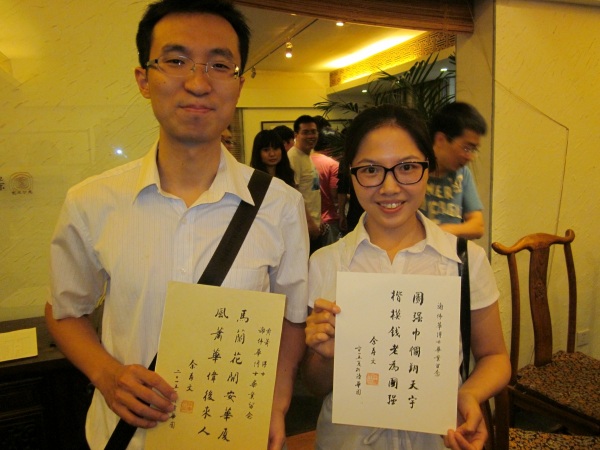
I joined my table when we went over to toast him, and said that I was very happy to meet my 师爷爷 (lab grandfather). He looked confused, so I had to explain – they had told me that we were all 师兄弟姐妹 (lab brothers and sisters), which makes Prof. Feng our 师父 (lab father), and him our 师爷爷. He seemed okay with the title :) It happened again when we went to toast another professor. Cheng whispered to me that he was Prof. Feng’s 师弟 (lab little brother), so I instantly responded with, oh, so he’s our 师叔叔 (lab uncle). He found this hilarious.
[Incidentally, there’s a similar custom in German, at least where your advisor is called your Doktorvater. Because Ellen’s a woman, I asked if I could call her my Doktormutter, and she didn’t exactly say no. I met her advisor in Germany last summer, too – my Doktorgroßvater?]
It was around this point, I realized that Stacy and I are very similar, actually. Everyone likes to have us around because we’re both cute and funny and can be counted on for a laugh or asked to perform on cue. Sometimes we’re shy and won’t speak, sometimes we jump into the spotlight. We also get away with a lot because we can’t really be expected to understand the rules. Eh, I’m actually not really bothered by this realization.
I told Prof. Feng about my proposed Chinese classes – ordering food, toasting, karaoke, and getting mad – and they all wanted to know about the last one. I told the story from Sanlitun again, and he said that we shouldn’t have paid them; once they take the money it’s their responsibility. I said, I knew what we should have done, but I didn’t know how to say it! That’s why I want that class. I just can’t argue or even hold my ground strongly in Chinese, because I just don’t have the vocabulary. I know “darn it” and “fuck your mother”, and nothing in between.
Some of the guys told Li Bo that I knew the phrase 不明觉厉 (I don’t understand but I think you’re great), and he said he wasn’t familiar with it. It’s a very ancient Chinese idiom, one guy responded. I think Confucius said it, I chimed in. Then GuoYang told us how it all came about: Confucius was walking and ran into Laozi, who told him a story, and Confucius responded: 不明觉厉. I about died laughing.
Then they taught me some English sayings – “You can you up” and “no can no BB”. I didn’t understand their explanations at the time – something about how some people think Kobe can make the shot and some people don’t? – but later someone explained it to me better. It’s sort of like “put up or shut up” – if you can do it, go do it, but if you can’t don’t bullshit (BB) about it. It’s a quote from George Washington, GuoYang told me solemnly. Hahaha.
As the night went on, the professors said their goodbyes and eventually we were left, about 20 grad students (and Li Bo) with a few more bottles of beer and one or two more bottles of baijiu. Someone finally noticed that one of the graduating students hadn’t been drinking, he’d just been making other people drink. He explained to me that he was just trying to make other people happy, and I tried to help him out (I don’t like seeing people being forced or pressured to drink) by commenting on how generous this was. But they kept insisting . . . so he grabbed a bowl of soup off the table and started toasting with that.
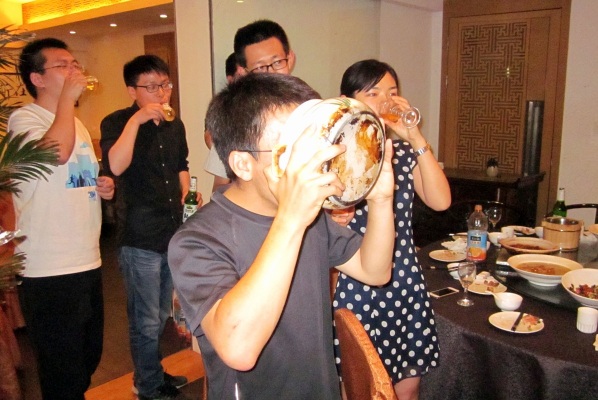
Once the baijiu was gone, we biked to the karaoke place to continue the party. I sang the songs that they ordered for me, which was actually a nice opportunity to see what songs they like (or that I actually sang well). Call Me Maybe, Domino, My Heart Will Go On, and 遇上你是我的缘 were hits. I also sang 坐上火车去拉萨, with a little help from Cheng. She is just the best. She gets me, you know? Exhibit A: she grabbed a mic and sang the hard characters, the ones that she figured I didn’t know. True friendship. Also before karaoke we stopped at a 7-11 to get drinks, and when I asked if they were 冰的 (ice cold), she answered no when every other Chinese person would say yes. She knows, though, that I like to drink ice-cold things, not the slightly-below-room-temperature drinks that pass for “ice-cold” in China.
I stayed until 1am or so. I ordered 朋友 as my last song, a really sentimental one about friendship and how we’ll always have each other. As I hugged WeiHua goodbye (she went for the hug!!), I asked her if I would see her again. She said we would. I’m not sure if she meant in the next few days around the office, or sometime in our lives. I’m not quite sure what I was asking about, honestly! But either way, I liked the answer.









